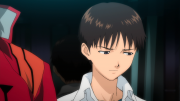Difference between revisions of "Rebuild of Evangelion"
RussianRiz (talk | contribs) m |
RussianRiz (talk | contribs) (→Storyline: there was major mistakes in this section, I will expand it later) |
||
| Line 22: | Line 22: | ||
Major differences include that while [[Kaworu Nagisa]] was originally introduced very late in the series in [[Episode 24]], in ''Rebuild of Evangelion'' he was briefly present in the first film. In addition, a new female major character named [[Mari]] appears starting from the second film. | Major differences include that while [[Kaworu Nagisa]] was originally introduced very late in the series in [[Episode 24]], in ''Rebuild of Evangelion'' he was briefly present in the first film. In addition, a new female major character named [[Mari]] appears starting from the second film. | ||
| − | The plot of the first ''Rebuild'' film ends with “Operation Yashima,” the battle against the Angel [[Ramiel]] in [[Episode 06]] which concluded the introductory story arc. The plotline of the second film ends in the battle against [[Zeruel]] in [[Episode 19]], but the story greatly differs from that of the original series, with the added developments of Kaworu's alternate role | + | The plot of the first ''Rebuild'' film ends with “Operation Yashima,” the battle against the Angel [[Ramiel]] in [[Episode 06]] which concluded the introductory story arc. The plotline of the second film ends in the battle against [[Zeruel]] in [[Episode 19]], but the story greatly differs from that of the original series, with the added developments of Kaworu's alternate role and Mari's entrance to the series. The third movie in the Rebuild, Evangelion 3.0: You Can (Not) Redo has even more shy connections with the end of the TV series and the beginning of End of Evangelion. The final movie itself does have connections and parallels to End of Evangelion, but develops its message in a completely new way. |
==Films== | ==Films== | ||
Revision as of 03:07, 21 September 2021

|
"I've heard this story countless times already." |
|
Rebuild of Evangelion movie series |
Rebuild of Evangelion (ヱヴァンゲリヲン新劇場版 Evangelion Shin Gekijōban, lit. "Evangelion New Theatrical Edition") is a series of four movies by the creators of Neon Genesis Evangelion, which form an alternate retelling of the original TV series. "Rebuild of Evangelion" constitutes a separate continuity from the continuity of the original TV series and associated movies, Evangelion: Death and Rebirth and The End of Evangelion.
The Rebuild movie series is intended to be more accessible and understandable to non-fans of the original series, even if new viewers have never seen the original series at all, while at the same time satisfying fans of the original series.
Production History
Anno initially began work on Rebuild films in the fall of 2002, spending nearly six months on pre-production before being delayed by various other projects such as the Live-Action Cutie Honey film, Re: Cutie Honey OVAs etc[1] In the December 2006 issue of Newtype, Anno revealed he was happy to finally recreate Eva "as he wanted it to be" in the beginning and that he was no longer constrained by technological and budget limitations.[2]
The release schedule of the Rebuild films has experienced many delays, with the first film pushed from its original summer release date to fall 2007, and the second film's release date shifted from 2008 to summer 2009. The third film, initially announced as a simultaneous release with Evangelion: Final in the summer of 2008,[3] was released in fall 2012.
In 2012, the final film was briefly listed on Khara's website for a 2013 release.[4] In October 2014, Anno announced that due to other commitments, which was later revealed to be his involvement with Shin Godzilla,[5] the film would be further delayed to an unknown date.
In 2019 the final film, now called Evangelion: 3.0+1.0 Thrice Upon a Time, was scheduled for a June 27, 2020 release date but received two delays due to concerns over the COVID-19 pandemic.[6] It was released on March 8, 2021.[7] Anno had planned to make a new Evangelion story since 2000[8] and wants to open-up the franchise in the future to new creators, but 3.0+1.0 was intended to be his final Evangelion work.[9][10]
Storyline
“Rebuild of Evangelion” was originally presented as an alternate retelling of the original Neon Genesis Evangelion: the first three movies were intended to be an “alternate retelling” of the series, while the fourth and final film is promised to be an entirely new, alternate ending to the series.
Major differences include that while Kaworu Nagisa was originally introduced very late in the series in Episode 24, in Rebuild of Evangelion he was briefly present in the first film. In addition, a new female major character named Mari appears starting from the second film.
The plot of the first Rebuild film ends with “Operation Yashima,” the battle against the Angel Ramiel in Episode 06 which concluded the introductory story arc. The plotline of the second film ends in the battle against Zeruel in Episode 19, but the story greatly differs from that of the original series, with the added developments of Kaworu's alternate role and Mari's entrance to the series. The third movie in the Rebuild, Evangelion 3.0: You Can (Not) Redo has even more shy connections with the end of the TV series and the beginning of End of Evangelion. The final movie itself does have connections and parallels to End of Evangelion, but develops its message in a completely new way.
Films
| English Title | Japanese Title | English Translation | Release date |
|---|---|---|---|
| Evangelion:1.0 You Are (Not) Alone |
ヱヴァンゲリヲン新劇場版:序 (Evangelion Shin Gekijōban: Jo) | Evangelion New Theatrical Edition: Prelude | September 1, 2007 (Japan) |
| Evangelion:2.0 You Can (Not) Advance |
ヱヴァンゲリヲン新劇場版:破 (Evangelion Shin Gekijōban: Ha) | Evangelion New Theatrical Edition: Break | June 27, 2009 (Japan) |
| Evangelion:3.0 You Can (Not) Redo |
ヱヴァンゲリヲン新劇場版:Q (Evangelion Shin Gekijōban: Q) | Evangelion New Theatrical Edition: Quickening | November 17, 2012 (Japan) |
| Evangelion:3.0+1.0 Thrice Upon A Time |
シン・エヴァンゲリオン劇場版:||(Shin Evangelion Gekijōban: || ) | New Evangelion Theatrical Edition: 3.0 + 1.0 | March 8, 2021 (Japan) |
Trivia
- The Japanese title for Evangelion 3.0+1.0 contains a musical repeat sign. While no official meaning for the repeat sign has been announced by Anno or Gainax, fans speculate that the inclusion of such a symbol may indicate either a "repeat" in events or possibly time travel shenanigans. This, however, has been widely considered as extremely unlikely and the inclusion of the symbol is most likely stylistic.
References
- ↑ https://khara.weblogs.jp/hideakianno/personal-biography.html
- ↑ http://www.animenewsservice.com/archives/decx.htm
- ↑ https://www.animenewsservice.com/archives/septxo.htm
- ↑ http://www.animenewsnetwork.com/news/2012-11-19/final-evangelion-film-no-longer-listed-in-2013
- ↑ https://www.evangelion.co.jp/news_20150401.html
- ↑ https://www.animenewsnetwork.com/news/2020-10-15/evangelion-final-film-opens-on-january-23/.165274
- ↑ https://www.animenewsnetwork.com/news/2021-02-26/final-evangelion-film-rescheduled-to-march-8-after-2-covid-19-delays/.170006
- ↑ https://www.worldcat.org/oclc/1121079437
- ↑ https://fullfrontal.moe/khara-10-part-2/
- ↑ https://www.cbr.com/evangelion-fourth-movie-wont-end-franchise/

